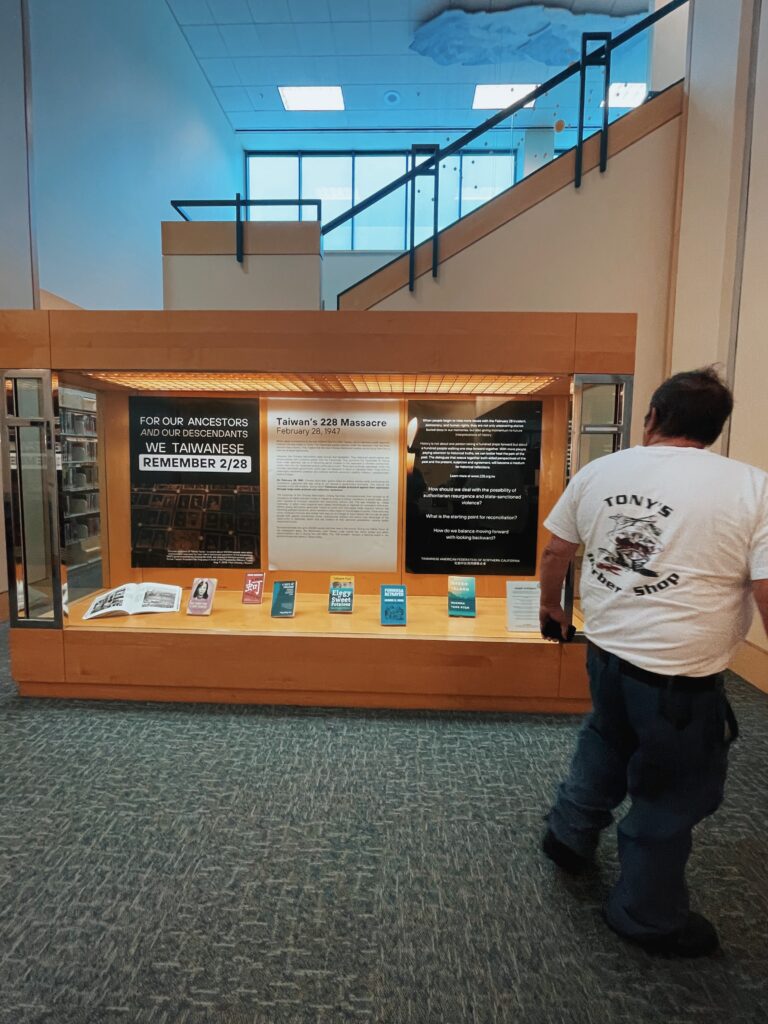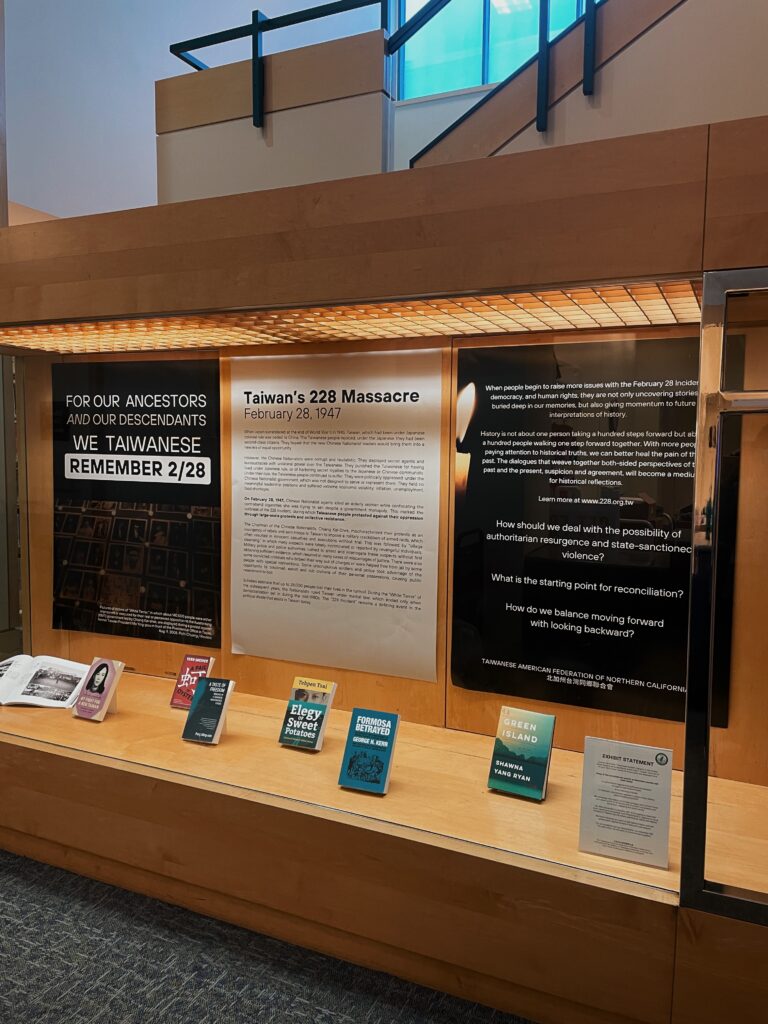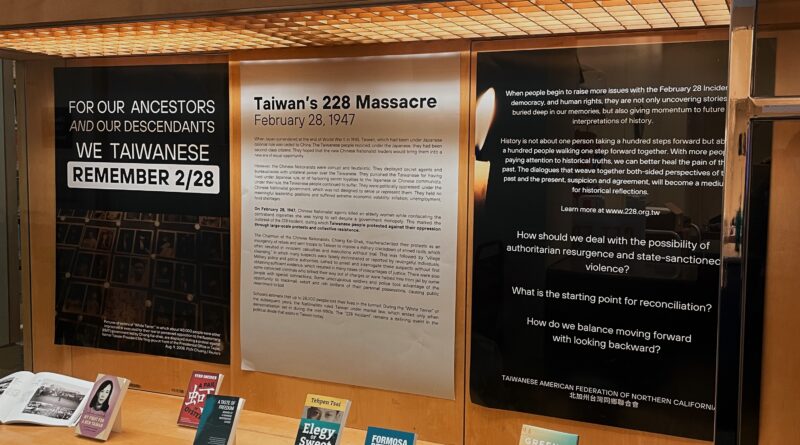On Display: Commemorating Taiwan’s 228 Massacre – Fremont Main Library, Feb 2-29, 2024
In remembrance of the 228 Massacre in Taiwan, TAFNC has a month-long exhibit at the Fremont Main Library. We encourage you to visit the display during library hours (below). 為了紀念台灣 228,TAFNC 在弗里蒙特主圖書館舉辦了為期一個月的展覽。
EXHIBIT INFORMATION:
The exhibit is on the ground floor; turn left once you walk past the checkout machines.
The display will run Feb 1 – Feb 29, 2024.
Fremont Main Library: 2400 Stevenson Blvd, Fremont, CA 94538
Friday 10 AM–5 PM
Saturday 10 AM–5 PM
Sunday 1–5 PM
Monday 12–8 PM
Tuesday 12–8 PM
Wednesday 11 AM–6 PM
Thursday 11 AM–6 PM
EXHIBIT STATEMENT:
During martial law, Taiwanese student migrants to the United States eagerly devoured library books that in Taiwan “you had to risk your life to read.” In remembrance of the February 28 massacre, for the month of February we are displaying some of those books alongside texts that testify to the horrors of the massacre and the period of White Terror that followed.
We offer this exhibit in solidarity with all struggling to have their truths heard and recognized, from Palestinians to Uyghurs to Hong Kongers to Tibetans and all others yearning for safety and dignity.
We honor literature as a form of self-determination and self-preservation against threats of obscurity and erasure.
For our ancestors and our descendants, we Taiwanese remember 228.
For each other, we will learn to move forward together.
YouTube Short Introduction:


BOOKS ON DISPLAY (Left to right):

My Fight for a New Taiwan: One Woman’s Journey from Prison to Power
By Hsiu-lien Lu and Ashley Esarey
Lu Hsiu-lien’s journey is the story of Taiwan. Through her successive drives for gender equality, human rights, political reform, Taiwan independence, and, currently, environmental protection, Lu has played a key role in Taiwan’s evolution from dictatorship to democracy. The election in 2000 of Democratic Progressive Party leader Chen Shui-bian to the presidency, with Lu as his vice president, ended more than fifty years of rule by the Kuomintang (Nationalist Party).
Taiwan’s painful struggle for democratization is dramatized here in the life of Lu, a feminist leader and pro-democracy advocate who was imprisoned for more than five years in the 1980s. Unlike such famous Asian women politicians as Burma’s Aung San Suu Kyi, India’s Indira Gandhi, and Pakistan’s Benazir Bhutto, Lu Hsiu-lien grew up in a family without political connections. Her impoverished parents twice attempted to give her away for adoption, and as an adult she survived cancer and imprisonment, later achieving success as an elected politician—the first self-made woman to serve with such prominence in Asia.
My Fight for a New Taiwan’s rich narrative gives readers an insider’s perspective on Taiwan’s unique blend of Chinese and indigenous culture and recent social transformation.

A Pail of Oysters
By Vern Sneider
Set against the political repression and poverty of the White Terror era in Taiwan, A Pail of Oysters tells the moving story of nineteen-year-old villager Li Liu and his quest to recover his family’s stolen kitchen god. Li Liu’s fate becomes entwined with that of American journalist Ralph Barton, who, in trying to report honestly about Kuomintang rule of the island, investigates the situation beyond the propaganda, learns of a massacre, and is drawn into the world of the Formosan underground.
First published in 1953, A Pail of Oysters was banned in Taiwan, and in the United States it was denounced by Chiang Kai-shek’s supporters: the powerful China Lobby. Anecdotal evidence suggests – and Sneider himself suspected – that his book was subject to suppression even in the United States by pro-KMT agents.
A Pail of Oysters is a landmark work from a time when novels were often seen as a moral force. But politics and historical importance aside, A Pail of Oysters is simply a good story well told.

A Taste of Freedom: Memoirs of a Taiwanese Independence Leader
By Ming-Min Peng
Peng Ming-min was imprisoned by the Kuomintang regime in Taiwan during the White Terror era for subversion. He was released from prison but still under house arrest when he evaded his minders and fled the country, first to Sweden and then to the US, where he led the fight for democracy in his homeland. He returned to stand as a candidate in the first democratic presidential elections in 1996. A Taste of Freedom is his incredible story.

Elegy of Sweet Potatoes: Stories of Taiwan’s White Terror
By Tephen Tsai
A gripping, vital account of one man’s imprisonment by Taiwan’s police state early in the Cold War.
In 1954 Tehpen Tsai was arrested by the Kuomintang regime on suspicion of being a Chinese communist agent. After initial weeks-long interrogation near his home he was transferred to a detention facility in Taipei specifically for seditionists and enemy operatives. The evidence against him: two books, one on his shelves at home, and one that another arrestee told police he had seen at Tsai’s house.
Tsai was not a communist. But in the febrile atmosphere of the early White Terror era in Taiwan that scarcely mattered; the secret police were commonly thought to operate by a rule to “never miss one true criminal, even if a hundred are killed mistakenly.” He had just one thing counting in his favour: he had recently returned from a scholarship in the USA, and the Chiang Kai-shek government at the time was sensitive to American attitudes and pressure.
In prison he met genuine communists, anti-government activists, intellectuals, and others like him, unlucky people swept up by a tenuous accusation or a chance encounter. One by one his cellmates disappeared, some to the execution grounds, others to Green Island, the notorious political prison off Taiwan’s east coast. Tsai was more fortunate. Sentenced to a term of “re-education”, he was released in November 1955.
Elegy of Sweet Potatoes is a thinly-fictionalized version of Tsai Tehpen’s experiences as a political prisoner. Names are changed, dates are fudged, but the narrative here is true to life. A compelling story full of rich description, pathos, and odd moments of humor, it is essential reading for anyone looking to understand the realities of martial law in “Free China”.

Formosa Betrayed
By George Kerr
Formosa Betrayed is a detailed, impassioned account of Chinese Nationalist (KMT) misrule that remains the most important English-language book ever written about Taiwan.
Author George H. Kerr lived in Taiwan in the late 1930s, when the island was a colony of Japan. During the war, he worked for the U.S. Navy as a Taiwan expert. From 1945 to 1947, Kerr served as vice consul of the U.S. diplomatic mission in Taipei, where he was an eyewitness to the February 28 Massacre and the subsequent mass arrests and executions.
As well as chronicling KMT repression during the early years of the White Terror, Kerr documents widespread corruption, showing how the island was systematically looted. The “betrayed” in the title refers not only to the crushing disappointment Taiwanese felt when they realized KMT rule was worse than that of the Japanese but also to the culpability of the American government. The United States was in large part responsible for handing Taiwan over to the Nationalists and helping them maintain their grip on power.
Formosa Betrayed has served as a foundational text for generations of Taiwanese democracy and independence activists. It has an explosive effect among overseas Taiwanese students; for many, the book was their first encounter in print with their country’s dark, forbidden history. A 1974 Chinese-language translation increased its impact still more. It is a powerful classic that has withstood the test of time, a must-read book that will change the way you look at Taiwan.

Green Island
By Shawna Yang Ryan
As an uprising rocks Taiwan, a young doctor in Taipei is taken from his newborn daughter by Chinese Nationalists, on charges of speaking out against the government. Although the doctor eventually returns to his family, his arrival is marked by alienation from his loved ones and paranoia among his community. Years later, this troubled past follows his youngest daughter to America, where, as a mother and a wife, she too is forced to decide between what is right and what might save her family–the same choice she witnessed her father make many years before. The story of a family and a nation grappling with the nuances of complicity and survival, Green Island raises the question: how far would you go for the ones you love?

